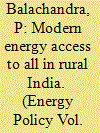|
|
|
Sort Order |
|
|
|
Items / Page
|
|
|
|
|
|
|
| Srl | Item |
| 1 |
ID:
171390


|
|
|
|
|
| Summary/Abstract |
Addressing the threat of global climate change will require large-scale transformation of our energy systems. Scholars are increasingly calling for a more systemic approach to studying energy transitions—one that incorporates human dimensions such as behaviors, attitudes, perceptions, and preferences. Drawing on an exploratory representative study (n = 379 surveys) conducted in the Pogány-havas microregion of eastern Transylvania, Romania, we employ Stephenson et al.’s Energy Cultures Framework to describe and discuss the social and material energy system of the region. We highlight the interactions between norms, energy practices and material culture, as well as external influences that are shaping the energy system. We discuss attitudes towards energy conservation and acceptability of community renewable energy schemes. Based on our findings, we define the dominant energy culture of the region and highlight elements of the system that are either reinforcing the status quo or shaping a more sustainable energy culture. We discuss implications for increasing the efficiency of the energy system of this region and factors that could inform energy policies and sustainability interventions. We conclude by situating our research within a larger narrative of rural energy transitions and discuss the value of a systems approach when undertaking energy systems research.
|
|
|
|
|
|
|
|
|
|
|
|
|
|
|
|
| 2 |
ID:
096092


|
|
|
|
|
| Publication |
2010.
|
| Summary/Abstract |
This paper describes how management and information failures can retard transitions from the traditional use of biomass fuel by low income rural consumers and micro-producers.
In general, societies move away from traditional biomass use as economic development takes place. If one accepts the doctrine of revealed preference (built on the initial work of Samuelson, 1938), then these trends imply that such transitions provide net gains in utility. This paper shows how various "failures" entrench existing fuel use patterns-hindering the transition to new fuel use patterns.
In order to qualitatively discuss how these transitions may take place, an indicative neo-classical description of consumer and producer behavior is used. Three types fuel-transition "driver" are identified. The effect of information and management failures on these drivers, and thus the energy transition, is discussed.
Reference is made to a specific case study in which a partial transition from biomass occurred in response to an intervention to address an environmental management failure (the deforesting of a carbon sink.)
It is concluded that interventions to encourage transitions to cleaner sustainable fuel use may need to recognize and address management and information failures in a systematic manner.
|
|
|
|
|
|
|
|
|
|
|
|
|
|
|
|
| 3 |
ID:
094839


|
|
|
|
|
| Publication |
2010.
|
| Summary/Abstract |
Renewable energy technologies have the potential to help solve two pressing problems. On one hand, carbon-free energy sources must play a role in climate change mitigation. On the other hand, renewables might help meet needs of rural people without access to modern energy services. However, if renewables are deployed to combat climate change (primarily resulting from emissions in the developed economies) then providing basic energy services in the developing world may be compromised. The tendency to conflate the two drivers by installing renewables in rural areas for carbon mitigation reasons rather than for development reasons could compromise both goals. The danger is supporting sub-optimal policies for mitigating carbon and for rural energy. This is problematic given the limited funds available for energy development and reducing greenhouse gases. This paper analyzes how these goals have been balanced by the Global Environment Facility (GEF). Project documents are used to determine whether incremental costs of installing renewables were covered by GEF funds and whether the costs are comparable with other carbon mitigation options. The results raise concerns about the effectiveness and appropriateness of GEF funding of such projects and highlight the importance of post-Kyoto framework design to reduce emissions and promote development.
|
|
|
|
|
|
|
|
|
|
|
|
|
|
|
|
| 4 |
ID:
110720


|
|
|
|
|
| Publication |
2011.
|
| Summary/Abstract |
Expanding energy access to the rural population of India presents a critical challenge for its government. The presence of 364 million people without access to electricity and 726 million who rely on biomass for cooking indicate both the failure of past policies and programs, and the need for a radical redesign of the current system. We propose an integrated implementation framework with recommendations for adopting business principles with innovative institutional, regulatory, financing and delivery mechanisms. The framework entails establishment of rural energy access authorities and energy access funds, both at the national and regional levels, to be empowered with enabling regulatory policies, capital resources and the support of multi-stakeholder partnership. These institutions are expected to design, lead, manage and monitor the rural energy interventions. At the other end, trained entrepreneurs would be expected to establish bioenergy-based micro-enterprises that will produce and distribute energy carriers to rural households at an affordable cost. The ESCOs will function as intermediaries between these enterprises and the international carbon market both in aggregating carbon credits and in trading them under CDM. If implemented, such a program could address the challenges of rural energy empowerment by creating access to modern energy carriers and climate change mitigation.
|
|
|
|
|
|
|
|
|
|
|
|
|
|
|
|
| 5 |
ID:
125617


|
|
|
|
|
| Publication |
2013.
|
| Summary/Abstract |
As the Secretary General of the United Nations and the president of the World Bank are calling upon countries to commit themselves to universal access to modern energy services by 2030, and international players such as the International Energy Agency, the EU, and ESMAP are building scenarios how to accomplish this, this article demonstrates the non-linear dynamics of scaling up rural energy access, drawing among others from over 70 energy access projects implemented by the EASE network of national energy and development NGOs in eight countries and on experiences combining microfinance and (clean) energy access. The article shows that scaling up rural energy access demands careful tuning of support to the business models of rural entrepreneurs, in which development finance has only a limited role to play. The article argues for market development approaches that take a programmatic approach, change their intervention model as the market matures, and build on smart use of the limited sector capacity. The ultimate challenge is how to down-tune ambitions and spending power of the development community to match the absorption capacity of rural markets and the reality of entrepreneurs on the ground.
|
|
|
|
|
|
|
|
|
|
|
|
|
|
|
|
| 6 |
ID:
150897


|
|
|
|
|
| Summary/Abstract |
Current policies and strategies related to the utilization of densified biomass fuel (DBF) in China are mainly focused on medium- or large-scale manufacturing modes, which cannot provide feasible solutions to solve the household energy problems in China's rural areas. To simplify commercial processes related to the collection of DBF feedstock and the production and utilization of fuel, a novel village-scale DBF approach is proposed. Pilot demonstration projects have shown the feasibility and flexibility of this new approach in realizing sustainable development in rural China. Effective utilization of DBF in rural China will lead to gains for global, regional, and local energy savings, environmental protection, sustainable development, and related social benefits. It could also benefit other developing countries for better utilization of biomass as a viable household energy source. This proposal therefore delivers the possibility of reciprocal gains, and as such deserves the attention of policy makers and various stakeholders.
|
|
|
|
|
|
|
|
|
|
|
|
|
|
|
|
| 7 |
ID:
110692


|
|
|
|
|
| Publication |
2011.
|
| Summary/Abstract |
The provision of adequate, reliable, and affordable energy has been considered as a cornerstone of development. More than one-third of the world's population has a very limited access to modern energy services and suffers from its various negative consequences. Researchers have been exploring various dimensions of household energy use in order to design strategies to provide secure access to modern energy services. However, despite more than three decades of effort, our understanding of household energy use patterns is very limited, particularly in the context of rural regions of the developing world. Through this paper, the past and the current trends in the field of energy analysis are investigated. The literature on rural energy and energy transition in developing world has been explored and the factors affecting households' decisions on energy use are listed. The and the factors affecting households' decisions on energy use are listed. The gaps identified in the literature on rural household energy analysis provide a basis for developing an alternative model that can create a more realistic view of household energy use. The three dimensional energy profile is presented as a new conceptual model for assessment of household energy use. This framework acts as a basis for building new theoretical and empirical models of rural household energy use.
|
|
|
|
|
|
|
|
|
|
|
|
|
|
|
|
| 8 |
ID:
121376


|
|
|
|
|
| Publication |
2013.
|
| Summary/Abstract |
The Indian Ministry of New and Renewable Energy (MNRE) launched the Village Energy Security Programme (VESP) in 2004 but discontinued it during the 12th Five Year Plan, starting in 2012, after a series of unexpected challenges. Planners structured the program so that a village energy committee (VEC) ran a decentralized village program involving biomass gasifiers, straight vegetable oil (SVO) systems, biogas plants, and improved cookstoves. This suite of technologies was intended to produce electricity and thermal energy to meet the "total energy requirements" of rural communities. At the end of January 2011, a total of 79 VESP projects were sanctioned in 9 states and 65 of these projects were fully commissioned, yet more than half were not operational. The MNRE envisaged that the VESP would provide energy services to eradicate poverty, improve health, reduce drudgery, enhance education, raise agricultural productivity, create employment, generate income, and reduce migration. However, VESP projects have had limited success, and the trials and tribulations of the VESP offers important lessons for policymakers launching rural energy programs in India and other developing economies.
|
|
|
|
|
|
|
|
|
|
|
|
|
|
|
|
|
|
|
|
|